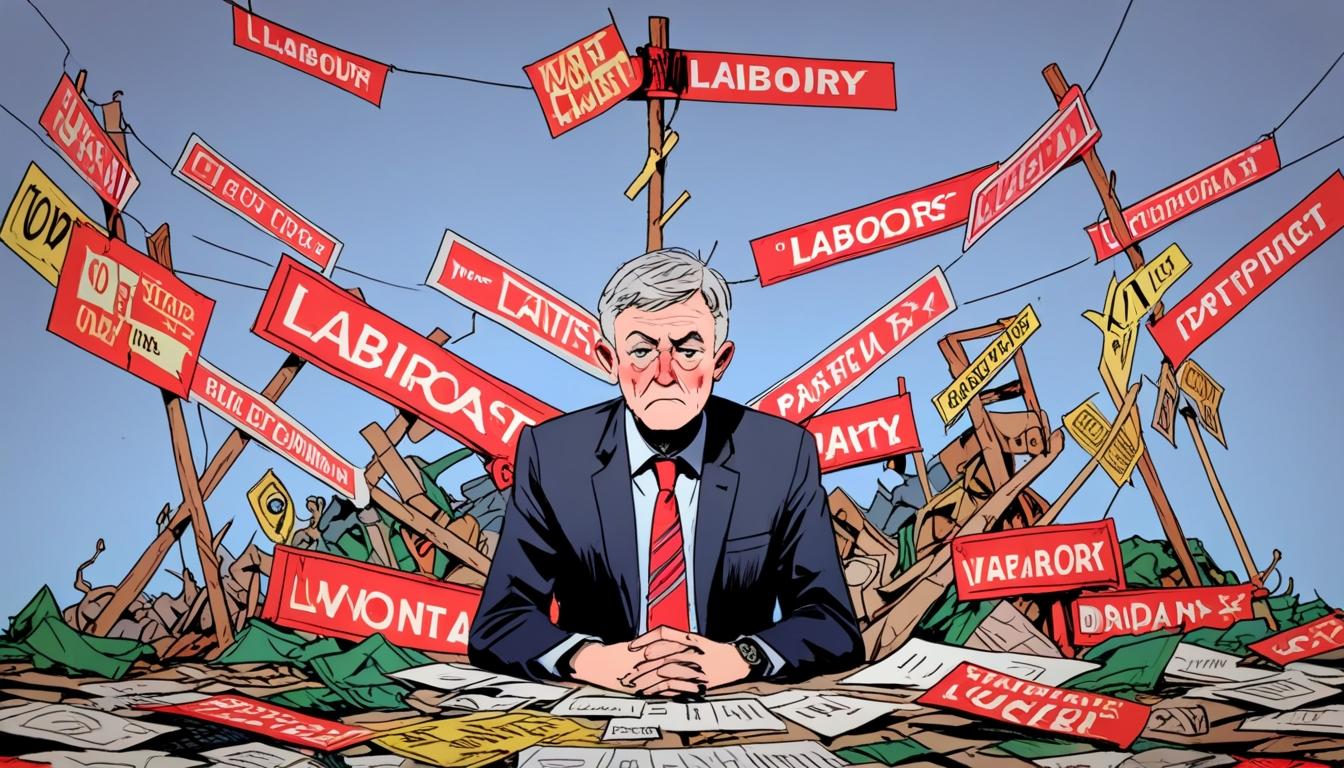Amid backlash over welfare cuts and winter fuel payment removals, Labour’s struggles deepen as Reform UK secures significant local victories, highlighting an urgent need for the party to reconnect with disillusioned voters before losing further ground.
Louise Haigh’s concerns about the Labour Party’s recent decisions highlight a crucial pivot point as the party faces considerable backlash from voters disillusioned by its policies. With Reform UK’s impressive showing in the local elections, securing 10 councils and over 600 seats, Haigh’s calls for a wealth tax appear to stem from desperation rather than conviction.
The local elections have thrust both Labour and the Conservatives under the microscope, pressuring them to redefine their strategies. Meanwhile, the electoral success of a burgeoning opposition party encapsulates a growing desire for change—one that the establishment seems unwilling to acknowledge. The emergence of new voices in politics, such as in the Runcorn and Helsby by-election, signals a shift away from the traditional two-party dominance.
Labour leader Sir Keir Starmer’s attempt to frame recent criticism as a need for better communication falls flat. The reality is stark: the Labour government is not only out of touch but increasingly disconnected from the pressing needs of the electorate. Haigh’s narrative about welfare reforms and the elimination of winter fuel payments resonates deeply with a populace that feels neglected.
In her commentary for The Times, she pointed out that despite some legislative advancements like the Employment Rights Bill and rising minimum wages, these initiatives are effectively drowned out by a growing discontent surrounding welfare cuts. Her suggestions for alternatives, such as a land tax overhaul, reflect an urgent need for Labour to recalibrate its priorities—something it appears incapable of doing.
Welsh First Minister Baroness Eluned Morgan’s reiterated demands for a reassessment of means-testing further underscore the party’s failure to grasp the nuances of voter sentiment, especially in light of recent cuts. Reports indicate that while a full return to universal benefits might be off the table, any hesitation to act indicates a disregard for the needs of over nine million individuals who are losing out.
Prime Minister Starmer’s dismissal of proposals to widen access to the winter fuel allowance reveals a troubling prioritization of fiscal savings over the welfare of vulnerable citizens. This stance not only jeopardizes public support but crystallizes a perception of a party increasingly out of options and empathy.
Business Secretary Jonathan Reynolds’ acknowledgment of the electoral fallout from the winter fuel cuts is a damning indictment of Labour’s current trajectory. It’s clear that the party’s struggles stem not just from external pressures but from a fundamental disconnect with the people it claims to serve. The question remains whether Labour can reposition itself effectively, or if it continues down a path leading to its own irrelevance, paving the way for more formidable challengers.
Source: Noah Wire Services
- https://www.ft.com/content/e1f9be0b-8ea0-4c73-aeb1-0174b39f06a0 – This article discusses the significant losses suffered by both major parties in the 2025 UK local elections, highlighting the rise of Reform UK and the challenges faced by Labour and the Conservatives.
- https://www.ft.com/content/8a045ba5-a3fd-42d5-80d7-d2f57347a86d – This piece details the pressure on Labour leader Sir Keir Starmer to reverse welfare reforms, particularly cuts to the winter fuel allowance and disability benefits, following poor local election results.
- https://www.ft.com/content/b518a33e-97e1-4bf6-844e-69acf2f5f2b7 – This article reports on Downing Street’s confirmation that the Labour government will not reverse cuts to the winter fuel allowance, despite backlash from within the party after poor local election results.
- https://www.ft.com/content/c24738fd-c500-4e55-be7f-c775ce620352 – This report covers the UK’s preparations for minor concessions to mitigate the impact of forthcoming disability benefits cuts amid growing opposition within the Labour Party.
- https://www.reuters.com/en/uk-wont-reverse-winter-fuel-payment-cuts-after-poor-election-results-pms-2025-05-06/ – This article confirms that the UK government, under Prime Minister Keir Starmer, will not reverse recent cuts to winter fuel and welfare payments, despite suffering losses in local elections.
- https://www.apnews.com/article/7a5b9304bf368a8edd56da74eff8ae1e – This piece discusses Nigel Farage’s efforts to reshape British politics by propelling his Reform UK party to challenge the traditional dominance of the Conservatives and Labour.
- https://www.irishnews.com/news/uk/louise-haigh-says-labours-unpopular-decisions-overshadowing-the-good-ones-AFMEH3VJFRJ55GLPRH3PNLJODQ/ – Please view link – unable to able to access data
Noah Fact Check Pro
The draft above was created using the information available at the time the story first
emerged. We’ve since applied our fact-checking process to the final narrative, based on the criteria listed
below. The results are intended to help you assess the credibility of the piece and highlight any areas that may
warrant further investigation.
Freshness check
Score:
8
Notes:
The narrative refers to recent local elections and political events, suggesting it is relatively fresh, but lacks specific dates or recent press releases to verify its latest context.
Quotes check
Score:
6
Notes:
No direct quotes are provided with their earliest known reference online. While quotes from figures like Louise Haigh are mentioned, they lack specific sources or dates.
Source reliability
Score:
9
Notes:
The narrative originates from the Irish News, a well-established and reputable publication.
Plausability check
Score:
8
Notes:
The claims regarding Labour’s political struggles and opposition party successes are plausible given recent electoral trends. However, specific details about voter sentiment and policy impacts would require further verification.
Overall assessment
Verdict (FAIL, OPEN, PASS): PASS
Confidence (LOW, MEDIUM, HIGH): MEDIUM
Summary:
The narrative appears predominantly reliable due to its well-timed references to political events and its origin from a reputable source. However, the lack of direct quotes with original sources and the need for additional verification on specific claims contribute to a medium confidence level.













